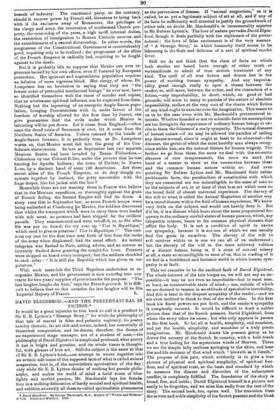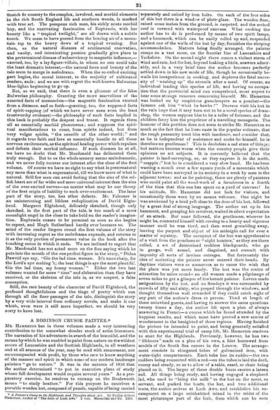DAVID ELGINBROD:—AND THE PRETERNATURAL IN FICTION.*
Jr would be a great injustice to this book to call it a pendant to Sir E. B. Lytton's "Strange Story ;" for while the philosophy of that tale of marvel is false and pedantic sophistry, its poetry tawdry rhetoric, its art rich and scenic, indeed, but essentially of theatrical composition, and its drama, therefore, the drama of an experienced stage manager, not of a student of man,—the philosophy of David Elgin brod is simple and profound, what poetry it has is bright and genuine, and its whole tissue is thought- ful, with gleams of true art. Still the subject is the same as that of Sir E. B. Lytton's book,—an attempt to weave together into an artistic tale some of the supposed facts of what is called animal magnetism, that is, of the materialistic spiritualism of the day ; only while Sir E. B. Lytton thinks of nothing but pseudo-philo- sophy, and makes the world of mind a lurid scene of blue- lights and morbid passion, Mr. Macdonald lays his founda- tion ins striking delineation of hardy mental and spiritual health, and exhibits avowedly all these so-called spiritualistic phenomena • David Eigiabrod By George Macdonald, M.A., Author of" Within and Without." 3 Vols. Buret aid Blackett. 1863. as the perversions of disease. If "animal magnetism," as it is called, be as yet a legitimate subject of art at all, and if any of its facts be sufficiently well attested to justify the groundwork of either tale, no doubt Mr. Macdonald's is immeasurably superior to Sir Bulwer Lytton's. The love of nature pervades David Elgin- brcul, though it deals partially with the nightmare of the preter- natural; the love of false excitement is of the very essence of "A Strange Story,' in which humanity itself seems to be. labouring in the flush and delirium of a sort of spiritual scarlet fever.
Still we do not think that the class of facts on which both stories are based have enough of either truth or verisimilitude to admit of true artistic treatment of any kind. The spell of all true fiction and drama lies in the power of exciting human sympathy. And any improba- bility great enough really to open a chasm between the reader, or, still more, between the writer, and the characters of a fiction,—any improbability, in short, which, on good or bad grounds, will seem to many to partake of the nature of absolute impossibility, strikes at the very root of the charm which fiction of any kind ought to exercise over the imagination. This seems to. us to be the case even with Mr. Macdonald's preternatural in- terests. Whether founded or not on scientific facts its assumptions are too foreign to the experience of ordinary human beings to ex- cite in them the fulness of a ready sympathy. The normal diseases. of human nature—if we may be allowed the paradox of calling any disease normal, since it ought at least to be abnormal—the diseases, the germs of which the most healthy man always recog- nizes within him, are the natural themes for human tragedy. The- farther we go from these, the more we deal with the eccentric diseases of rare temperaments, the mote we need the hand of a master to show us the connection between these and the common human nature within Ms. And even granting Sir Bulwer Lytton and Mr. Macdonald their rather problematic facts, the peculiarities of constitution with which they are connected are too unintelligible to the mass of men to be the subjects of art, or at least of that best art which rests on the broad field of almost universal experience. The slavery of- the will to what is called the Animal Magnetism of another may be a moral disease within the field of human experience. We know. very little on the subject, and would not hastily deny it. But if it be, it is a disease which bears about the same proportional fre- quency to the ordinary morbid states of human passion, which, say idiopathic tetanus, bears to the common physical diseases that afflict the body. It is not a condition of spirit to excite our sympathy, because it is not one of which we can usually find the germ in out-selves. The slavery of the will to evil motives within us is one we can all of us understand ; but the slavery of the vall to the mere arbitrary volition of a distant human being is, if a state of natural misery at all, a state so unintelligible to most of us, that in reading of it we feel in a bewildered and fantastic world in which human sym- pathy is at fault.
This we conceive to be the cardinal fault of David Elginbrod. The whole interest of the tale hinges on, we will not say an im- possible—it may be not even an improbable—but to most men, at least, an inconceivable state of mind ;— one, outside of which we are doomed to remain in an attitude of speculative incredulity.. And this is fatal to the deepest sympathy of the reader,—and we are even inclined to think to that of the writer also. In the first book his finest powers are put forth, and the reader's sympathy is completely secured. It would be difficult to draw a nobler picture than that of the Scotch peasant, David Elginbrod, from whom the story takes its name ; but who only appears in person in the first book. So far, all is health, simplicity, and sunshine, and yet the health, simplicity, and sunshine of a truly poetic imagination. Mr. Macdonald draws his peasant group as he draws the scenery of the Scotch fir country, with a bold touch and a true feeling for the mysterious winds of Heaven. There we see the simple lofty outlines springing to the skies, and hear- the audible murmur of that wind which " bloweth as it listeth." The purpose of this part, which evidently is to give a true picture of physical and spiritual simplicity, of sphitual free- dom, and of spiritual trust, as the basis and standard by whick to measure the disease and distortion of the subsequent conflict, is completely fulfilled. The foundation of the story is broad, free, and noble ; David Elginbrod himself is a picture not easily to be forgotten, and we miss him sadly from the rest of the story. The second book, too, opens well. The transition from the severe and noble simplicity of the Scotch peasant and the bleak
scotch fir country to the complex, involved, and morbid elements in the rich South England life and southern woods, is marked with true art. The pompous rich man, his sickly acute morbid boy, and the enervating fascination of Euplirasia, with her beauty like a "tropical twilight," are all drawn with a subtle touch. We seem to have passed from the bracing air of a moun- tain top to the heavy dews of a tropical evening. But then, as the natural diseases of sentimental enervation, and vanity, and intoxicating passion gradually give place to the preternatural disease of subserviency to magnetic influence,— exerted, too, by a lay-figure-villain, in whom no one could take the least dramatic interest,—the natural force and beauty of the tale seem to merge in melodrama. When the so-called exciting part begins, the moral interest, to the majority of cultivated veaders, ends ; and we see with regret the well-known Bulwerian blue-lights beginning to go up.
Not, as we said, that there is even a glimmer of the false Bulwerian philosophy. Granting the mare marvellous of the asserted facts of mesmerism—the magnetic fascination exerted from a distance, and so forth—granting, too, the supposed facts of spirit-rapping (of which we have never seen even the least trustworthy evidence)—the philosophy of such facts implied in this book is probably the deepest and truest. It regards them all as essentially morbid phenonema; and supposes the spiri- tual manifestations to come, from spirits indeed, but from very vulgar spirits, " the canaille of the other world;" and it regards true faith and love as essentially hostile to all these nervous excitements, as the spiritual healing power which repulses and defeats their morbid influence. If such diseases be at all, we have no doubt that Mr. Macdonald has delineated them truly enough. But to us the whole scenery seems melodramatic, and we never fully recover our interest after the close of the first volume. Of course we have no right to say what is preternatural any more than what is supernatural, till we know more of what is natural. Still few men can avoid feeling that the sins of the sel- fish heart are of far wider and more universal interest than the sins Still, the rare beauty of the character of David Elginbrod, the profound thoughtfulness and the tinge of poetry which run through all the finer passages of the tale, distinguish the story by a very wide interval from ordinary novels, and make it one which, even were it still more imperfect, we should be very sorry to have lost.





























































 Previous page
Previous page